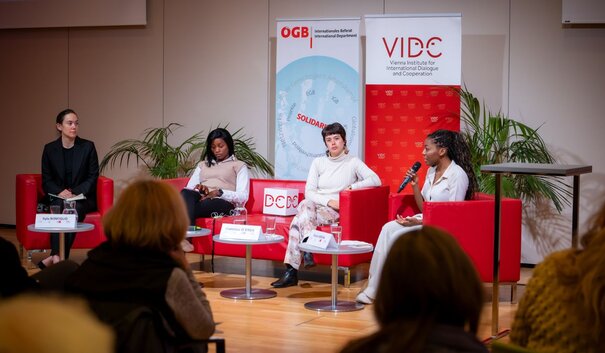Rebecca Abongo, climate representative of the Kenyan trade union federation COTU, discussed with Ayla Bonfiglio from the Mixed Migration Centre in Nairobi and climate activist Francesca O'Brien the climate crisis, migration and the role of Europe.
In her welcome address,Emma Wyschata (OGB/Solidar) pointed out that from the view point of a Trade Union Federation the world was globally inequal and with a view to the climate crisis this gets more problematic. Therefore it is most important to talk about the inequality beyond borders. Franz Schmidjell stressed the aggravated pressure due to the outcome of the US elections and the new EU agenda where climate crisis is no longer top priority but competitiveness and border security. The panel should help us to understand better the impact of climate crisis in terms of new migration patterns and how to align a Just Transition with labour and community rights. He underlined that Africa was most affected but least responsible for the climate crisis. However, there exists not only a gap between the North and the South. The richest 1% people were responsible for the same amount of carbon emissions than the poorest 66% of the world population. Valentin Wedl (AK Wien) pointed out the brochure on the campaign “The right not to have to leave” which should highlight that climate crisis can only be handled if the global and social issue is seen.
The moderator and journalist Gracia Ndona introduced the speakers and opened the discussion by underlining the exceptional global heat in the past decade which contributed to the 123 million displaced people are displaced around the world. The discussion took place in light of the beginning of COP 29.
Just transformation
Rebecca Abongo,Program Coordinator for Climate Change and Just Transition at the Central Organization of Trade Unions in Kenya (COTU-K), remarked that during her studies of Climate Change and Adaptation she came to the conclusion that climate crisis was a trade union related theme. This was shown by the example of 300 workers, who came to the union office when the Kenyan government banned single use plastic bags.
She continued that it depicted the necessity to consider how to make workers adapt and respond to climate crisis as well as to better protect them and secure the environment regarding Just Transition in order to not leave anybody behind. Ms. Abongo described the work with the government as good as they were politically well aligned and worked in parallel with the government to come up with a consensus. Additionally, they have social dialogues bilaterally with employers. Regarding the climate crisis, policies speak upon trainings and education, the board members work with the government to strive for curricula for reskilling etc. There are team representatives in the 45 affiliated trade unions. Ms. Abongo noted that trainings should be done in the respective sectors. Within a Just Transition, workers in the transport sectors have specific needs in terms of labour rights, decent work and green jobs.
As a representative of COTU at the UN climate conference COP29, Ms. Abongo demanded for finance plan and a climate fund that includes trainings and re-employment for workers. She stressed that many climate solutions would not consider workers as vulnerable people. There needs to be financial aid in energy sectors, in order to go from brown to green workers. She stated that there were jobs completely destroyed and, therefore, there was a need for climate finance. She also pointed out that where there was a social dialogue, the tripartite system had worked and this structure should be duplicated in the climate crisis issue.
To the question on how challenges to migration were responded to, Ms. Abongo stated that migration centres were working on mobility and every worker was given liberal rights. She indicated that labour officers were connected with the trade union.
Ayla Bonfiglio,head of the mixed Migration Centre for Eastern and Southern Africa, Egypt and Yemen, provided an overview of the complex climate (im)mobilisation in East Africa (dashboard overview). 25 million people were internally displaced due to various factors, another 8 million people due to the conflict in Sudan. Between 2021 and 2023, severe droughts and floods affected 36 million people. At the same time, people are less mobile and stranded due to climate crisis-related disasters. At the end of 2023, a flood disaster in Somalia affected around 1.6 million people and about 500,000 people were displaced.
Ms Bonfiglio explained that several factors usually lead to forced migration. For Ethiopians and Somalis in Kenya, environmental factors played a major role, while for other migrants, economic factors or conflicts, such as the war in Sudan, were among the causes. In terms of the time taken to decide to migrate, it is usually between one and three years from the time they were affected by the drought. The loss of livestock, crop losses and the rise in food prices were the main environment related triggers.
Ms Bonfiglio emphasised that disentangling the causes is less important than understanding how people respond to the climate crisis. Three patterns emerge: immobility, internal displacement or cross-border movements. With regard to cross-border migration, 90% of respondents favoured East Africa or the Gulf states as a destination. Europe was only mentioned by a small proportion. There are three different migration routes: the eastern route to the Gulf States/Saudi Arabia, the southern route to southern Africa and the northern route to North Africa/Europe.
Expectations for COP 29

Francesca O'Brien, climate activist and spokesperson for the ‘People's Summit against European Gas Conference’, said that we in Austria and the EU need to talk about climate justice. The global North, with the USA, Europe and Canada, is the biggest polluter and cause of the climate crisis, but has also exploited African countries. In a historical context, China is not the leading cause of the climate crisis. It is important to remember that many of our consumer goods, such as telephones, are produced elsewhere. 100 companies are responsible for around 70% of global greenhouse gases. They are sitting at the COP29 in Baku or in the EU. The polluter pays principle must also be applied to the climate crisis, similar to water pollution, and fossil fuel industries must make their contribution. O'Brien referred to another form of exploitation of the Global South by the financial system in the ‘green economy’. The interest rate on loans for solar projects in Europe is 2.8%, while in India it is 11% and in Argentina 54%.
In terms of expectations for COP 29, Ms. O'Brien said, she could not speak for all climate activists. However, some remain hopeful that heads of government will listen to their demands. The problem, she noted, is that climate activists are not invited to the table. It is clear that there will be no end to the use of fossil fuels, as fossil fuel lobbyists continue to hold significant influence. Together with other activists, she has organized a counter-conference to the European Gas Summit 2023. One key partner, "Don't Gas Africa," is demanding that Africa not be pushed further into gas production.
During the audience discussion, a question was raised regarding the responsibility of national and local governments working with investors. Ms Abongo noted that in Kenya, the government has created a separate budget for climate change with the respective districts. This is also intended to find solutions with local communities and civil society. She cited the Lamu coal-fired power plant as an example. After years of campaigning and widespread local resistance, Kenyan courts revoked the power plant operator's environmental licence in 2019. With regard to the possible consequences of ‘green’ growth, she reported on a hydrogen company that led to the resettlement of residents, who were compensated.
Rebecca Abongo concluded by emphasising that it was important to avoid further debt for the countries of the Global South and that climate financing should take the form of compensation payments rather than loans.
In projects such as the controversial East African Crude Oil Pipeline (EACOP), it is important to cooperate with local communities. Activism for climate justice must be seen as solidarity between communities and continents. This requires new formats in which local communities are involved.
Podium
Rebecca Abongo
is a Program Program for Coordinator Climate Change and Just Transition at the Central Organization of Trade Unions in Kenya (COTU-K). As an environmental management specialist, she contributes meaningfully to climate change adaptation and mitigation, environmental resource management, just transition, poverty eradication, and gender equality. Rebecca holds a Master’s degree in Environmental Science from Pwani University (Kenya) and a Master’s degree in Climate Change and Adaptation from the University of Nairobi. She has gained extensive experience in program management through her work with both international and local partners, which has enhanced her skills in leadership, problem-solving, communication, computer literacy, and research.
Ayla Bonfiglio
is the Head of the Mixed Migration Centre for Eastern and Southern Africa, Egypt, and Yemen. From 2019 to 2022, she served as the Head of MMC’s North Africa hub. With 15 years of experience working on issues related to forced migration and mobility, her doctoral research at Maastricht University focused on how refugees and migrants make strategic decisions about their movements in relation to higher education. In this role, she conducted several hundred in-depth interviews with refugees and migrants in Kenya, South Africa, and Uganda. She holds an MSc in Forced Migration from the University of Oxford and a BA in Political Science from Columbia University, where she was awarded the Charles Beard Prize for her dissertation on refugee self-reliance. She has worked and conducted research in various countries across North and Sub-Saharan Africa for a range of organizations, including GIZ, ICMPD, IOM, UNESCO, UNODC, and UNHCR.
Francesca O'Brien
is a climate activist and spokesperson for the ‘People's Summit against European Gas Conference’. She is active in the climate justice movement and campaigns for a fair and democratic energy transition.
Gracia Ndona
works as a freelance journalist for the Süddeutsche Zeitung and as a freelance presenter. She holds a bachelor's degree from the Vienna University of Economics and Business. Along with friends, she co-founded the association Afrikanische Diaspora Österreich (ADOE), which now has over 200 members. ADOE aims to highlight the diversity within the Black community and provide a platform for networking. Gracia Ndona, in collaboration with the ADOE team, has developed various initiatives, including interactive panel discussions with prominent figures from the African diaspora, the Africa Quiz Night, and the event "ADOE Presents: Loving Black."






